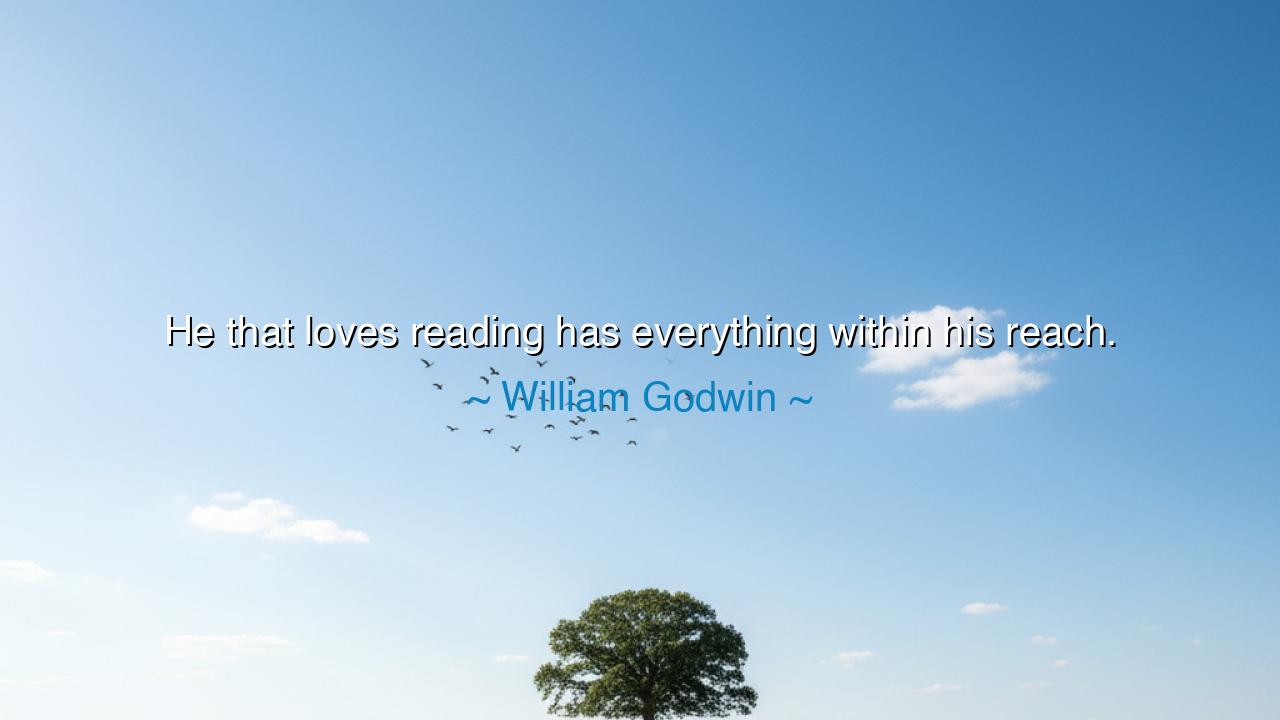
He that loves reading has everything within his reach.






There are words that shine like eternal lanterns along the road of wisdom, and among them are those spoken by William Godwin, philosopher, novelist, and reformer of the 18th century: “He that loves reading has everything within his reach.” These words, though simple, contain the vast power of civilization itself. For in them lies the truth that knowledge is freedom, and that through the love of reading, one may hold the treasures of all ages in the palm of one’s hand. Godwin, a man of reason and moral conviction, believed that the mind, once awakened through thought and literature, could transcend every boundary of birth, class, or circumstance. His words remind us that the library is not merely a house of books—it is a kingdom without walls, where every reader is sovereign.
To love reading, as Godwin says, is not merely to seek amusement or distraction, but to live with a hunger for understanding. Books are the silent teachers of humanity; they speak across centuries, carrying the thoughts of the dead into the hearts of the living. The reader communes with the greatest minds—Plato, Shakespeare, Confucius, Newton, Tolstoy—and through them learns the depths of human nature, the laws of the universe, and the mysteries of the soul. What man can call himself poor who has such wealth of spirit within his grasp? What obstacle can truly bind him who has, through books, conversed with eternity? It is as Godwin says—when one loves reading, everything is within reach, for no gate remains locked to the mind that knows how to seek.
The origin of Godwin’s thought lies in the Enlightenment, an age when reason rose like a new dawn over Europe. Born in 1756, William Godwin was a radical thinker who believed in the perfectibility of man—that through education, empathy, and intellect, human beings could refine themselves beyond ignorance and cruelty. For him, reading was the great equalizer, the power that could transform peasants into philosophers and orphans into sages. He saw in books not just learning, but liberation. His words, then, were not idle praise of scholarship; they were a battle cry against darkness, against tyranny of mind and spirit. Through reading, he declared, every man might claim dominion over his own destiny.
History itself offers radiant proof of his truth. Consider the story of Frederick Douglass, born into slavery in 1818, denied every right of learning. Yet as a boy, he stole moments to read, tracing words on fences, copying letters from shipyards, devouring newspapers in secret. “Once you learn to read,” he later said, “you will be forever free.” Reading gave him wings—he escaped bondage not merely in body but in soul. Through books, Douglass found ideas of liberty, dignity, and justice that reshaped not only his life, but the conscience of a nation. In him, Godwin’s words come alive: the man who loves reading truly has everything within his reach, for even in chains, his mind walked in realms of kings and prophets.
Indeed, to love reading is to possess an inexhaustible companion. Wealth fades, power corrupts, beauty wanes—but the mind fed by books grows only richer with age. The reader may walk through deserts and yet carry gardens within; he may lose all worldly possessions, yet his thoughts remain unbroken. Every book is a seed that grows quietly in the heart, and those who tend this garden of knowledge find themselves sustained in all seasons. Through reading, one may travel across oceans, through time, into the hearts of strangers—and return wiser, kinder, and more whole. The man who reads does not merely survive; he expands, transcending the limits of his own life.
But there is a secret within Godwin’s wisdom that few remember: it is not enough to read; one must love reading. For love is what transforms words into revelation. The casual reader seeks distraction, but the true reader seeks transformation. To love reading is to read with humility, to approach every page as a student approaches a teacher, ready to be changed. Such love awakens the mind’s deepest powers: curiosity, empathy, reflection. It turns ink into fire. Through this love, the reader becomes both explorer and creator, for what he learns from books he reshapes in life.
So let this truth stand as a lesson to all who seek meaning in a restless world: cultivate a love of reading, and you will never be poor, never alone, never powerless. Let books be your companions, your mentors, your mirrors. Read not for vanity, but for vision; not to escape life, but to enlarge it. Begin with wonder, continue with discipline, and end with gratitude—for every book, every story, every idea is a doorway to something greater.
And thus we return to Godwin’s eternal wisdom: “He that loves reading has everything within his reach.” For the one who reads with heart and mind awakened holds the universe in his hands. Kingdoms rise and fall, gold is spent, and monuments crumble—but knowledge endures. The love of reading is the wellspring of all freedom, the quiet path by which ordinary men and women ascend into greatness. Nurture it, and you will find that within the turning of a single page lies the whole vast treasure of the world.






AAdministratorAdministrator
Welcome, honored guests. Please leave a comment, we will respond soon